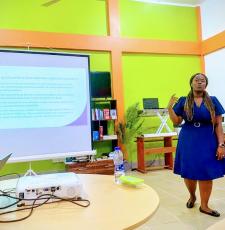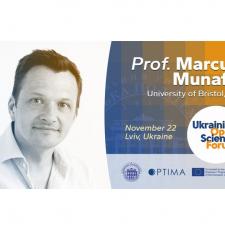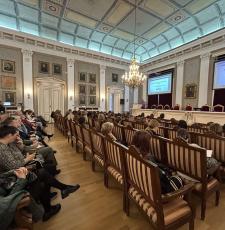
Teresa Hackett, EIFL Copyright and Libraries Programme Manager, shares video highlights from a one-day workshop on Promoting Access to Knowledge (A2K) and the Right to Research (R2R) in Kenya, with representatives from the education, research, library and disability communities, as well as academics and regulators from the field of copyright.
What copyright challenges do librarians, educators and researchers in Kenya face? How does Kenyan copyright law support access to knowledge and the right to research? What plans does the regulator have with regard to copyright limitations and exceptions, and who owns the copyright in an AI-generated work?
Watch video highlights from a one-day workshop in Nairobi co-organized by EIFL that explores the intersection between copyright law, access to knowledge and the right to research. See also the launch of the Kenyan edition of ‘Getting Started. Implementing the Marrakesh Treaty for persons with print disabilities’, prepared by EIFL with our partner, Kenya Libraries and Information Services Consortium (KLISC) and the Kenya Copyright Board (KECOBO).
The digital dilemma - which way Kenya?
The workshop was organized by EIFL, KLISC, the Centre for Intellectual Property and Information Technology Law (CIPIT) and the Program on Information Justice and Intellectual Property (PIJIP), in cooperation with KECOBO. It set out copyright challenges faced by user communities - librarians facing the ‘digital dilemma’ of navigating complex copyright rules while fulfilling their mandate to provide easy access to information; teachers and lecturers struggling to provide access to affordable textbooks and learning materials; researchers refused permission to use publicly available datasets in order to build translation tools for African languages. An international context was provided by PIJIP, which presented research on comparative copyright exceptions, and new global findings on the role of licences in helping or hindering the right to research.
While limitations and exceptions in Kenyan copyright law allow for a range of uses, analysis presented by CIPIT shows that the exceptions do not adequately support activities in the digital environment, such as text and data mining for research purposes. The good news is that KECOBO is currently examining how the law in Kenya might be adapted for text and data mining (TDM), and other modern uses by libraries and education. Options include, for example, introducing a specific exception for text and data mining and/or broadening fair dealing (cf. UK and US law). Singapore has done both, while in Nigeria, the newly expanded fair dealing provision accommodates technological innovations such as TDM. Whichever way Kenya goes, it is not alone in its endeavours to modernize copyright exceptions for digital uses.
Launch of ‘Getting Started’ guide - a step forward for people with print disabilities
EIFL was delighted to co-launch the Kenyan edition of ‘Getting Started. Implementing the Marrakesh Treaty for persons with print disabilities’ with Mr Martin Kieti, Bookshare Africa, the Kenya Copyright Board (KECOBO) and our partner, the Kenya Libraries and Information Services Consortium (KLISC). We hope that the guide, prepared by EIFL with KLISC and KECOBO, will encourage libraries in Kenya to make full use of their new rights under the Marrakesh Treaty and that it will contribute to an increase in the availability of reading materials for people with print disabilities.
Links to video highlights and more information
Watch highlights from the workshop (PIJIP Youtube channel):
- Limitations and exceptions here.
- Launch of the Marrakesh Treaty ‘Getting Started’ guide (Kenyan edition) here.
Watch the full sessions (CIPIT Youtube channel):
Background
The workshop, ‘Promoting Access to Knowledge and the Right to Research’ took place in Nairobi on World IP Day (26 April 2023). It was hosted by CIPIT at Strathmore Business School. The speakers and moderators came from nine organizations and institutions in academia, government, libraries and education (CIPIT, KLISC, KECOBO, Bookshare Africa, Universities’ Academic Staff Union (UASA), EIFL, PIJIP). There were 249 participants (70 in-person and 179 online). Online participants came from 19 countries (Kenya, US, South Africa, Uganda, Poland, Japan, Malawi, Rwanda, Thailand, Chile, Nigeria, Ghana, Togo, Lesotho, Germany, Italy, Canada, Armenia, India.
The event was supported by the Right to Research in International Copyright Law, a project supported by Arcadia – a charitable fund by Lisbet Rausing and Peter Baldwin.
SHARE / PRINT









